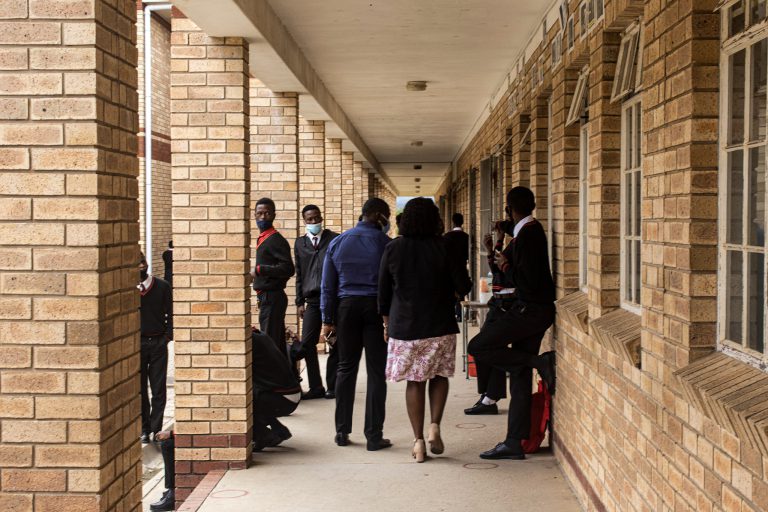Earlier this year, hundreds of generous Makhandans donated 520 memory cards packed with rich learning resources to matrics in local no-fee paying schools. In this opinion piece, TRISTAN COOKE asks why the state is leaving it up to citizens to unlock the huge potential of the digital revolution for public education.
COVID-19 severely disrupted last year’s Grade 11’s. And as they entered matric at the start of this year, they were desperate for any support to help them catch up.
Digital learning resources are abundant, hanging in the ‘cloud’ in the form of study guides, video lessons and past exam questions, and much of it is zero-rated for data.
Learners either don’t know they’re there or don’t have enough storage space to enable a download onto their mobile devices.
In 2021, a group of Rhodes University Community Engagement (RUCE) volunteers found a simple solution. Most learners either own a smart mobile device or have access to one in their households. So the volunteers copied a wealth of learner support materials onto SD memory cards and hand-delivered them to 520 Grade 12 learners studying at Makhanda’s no-fee paying schools.

Each card cost just R110 – but was stuffed led to the brim with 32GB of personalised subject content.
The generosity of local Makhandans sponsored the cards.
Contrast this with the Eastern Cape Education Department’s R538-million contract to lease 55 000 e-learning tablets to last year’s matric cohort.
That’s R9 781 per learner – for access to pretty much the same content. Why prioritise expensive tablets when the importance is in the information provided to learners?
The Department does not explain this.
The company that won the contract, Sizwe Africa IT Group, is a subsidiary of Ayo Technology Solution. African Equity Empowerment Investments — controlled by businessman Iqbal Survé’s Sekunjalo Investment Holdings — is a shareholder.
The Eastern Cape High Court in Bhisho suspended the contract pending the outcome of a court case to review the alleged lack of an open tender for the contract. It was alleged by the State Information Technology Agency (Sita) that the contract was unlawful and that millions of rands had been siphoned off from the Department to Sizwe.
The Department has still not recovered the tablets. According to DA education spokesperson Yusuf Cassim, learners have been threatened with criminal action adding controversy to a project that ought to be supporting, not criminalising, South Africa’s youth.
This year’s matrics were locked down for most of last year, and they haven’t written an exam since 2019. Earlier this year, hundreds of concerned Makhanda citizens stepped up to fill the vacuum created by the state’s broken tender, to sponsor the R110 SD cards.
The initiative sprang into life in the wake of a highly successful pilot project last year. The Vulindlela programme provided the children of Rhodes University staff with digital learning materials after lockdown closed schools. The Amakhala Foundation also funded the delivery of SD cards to children in communities linked with the Amakhala Game Reserve.
SD cards emerged as the most cost-effective and practical method to deliver the materials, especially since every child in the project had access to a compatible smartphone and/or laptop.

But what about learners who don’t have access to such devices?
Well, think about this: an R800 smartphone plus a R110 SD card means that every matric in the province would own a learner-enabled smart device for less than R1000 – at a tenth of the R578m that the Department forked out to Sizwe.
But why stop there? Every high school learner in the province could have access to learner-enabled smartphones for less than the Sizwe contract. After the initial outlay, the state would only purchase new phones for the incoming Grade 8 class.
As South Africa moves toward a digital revolution, Cyril Ramaphosa has raised concerns over poorer communities being left behind. Widescale digital literacy in no-fee paying schools is critical to that revolution.
He could walk that talk by supporting grassroots initiatives like the Makhanda SD card project.
About the writer
I am Tristan Cooke, a fourth-year Journalism and Media Studies student at the University Currently Known as Rhodes. I grew up in Zimbabwe, where adaptation and grit are essential survival skills. It is also a place where censorship has been normalised. But, belief in Africa underpins my life and work, and journalism has given me some tools to articulate our common struggle for equity and human rights.
Beyond journalism, I am most happy outdoors and fly fishing is a medium with which I communicate with our planet.
If you have stories you would like to share or have investigated, feel free to contact me at: mu16coot@gmail.com



